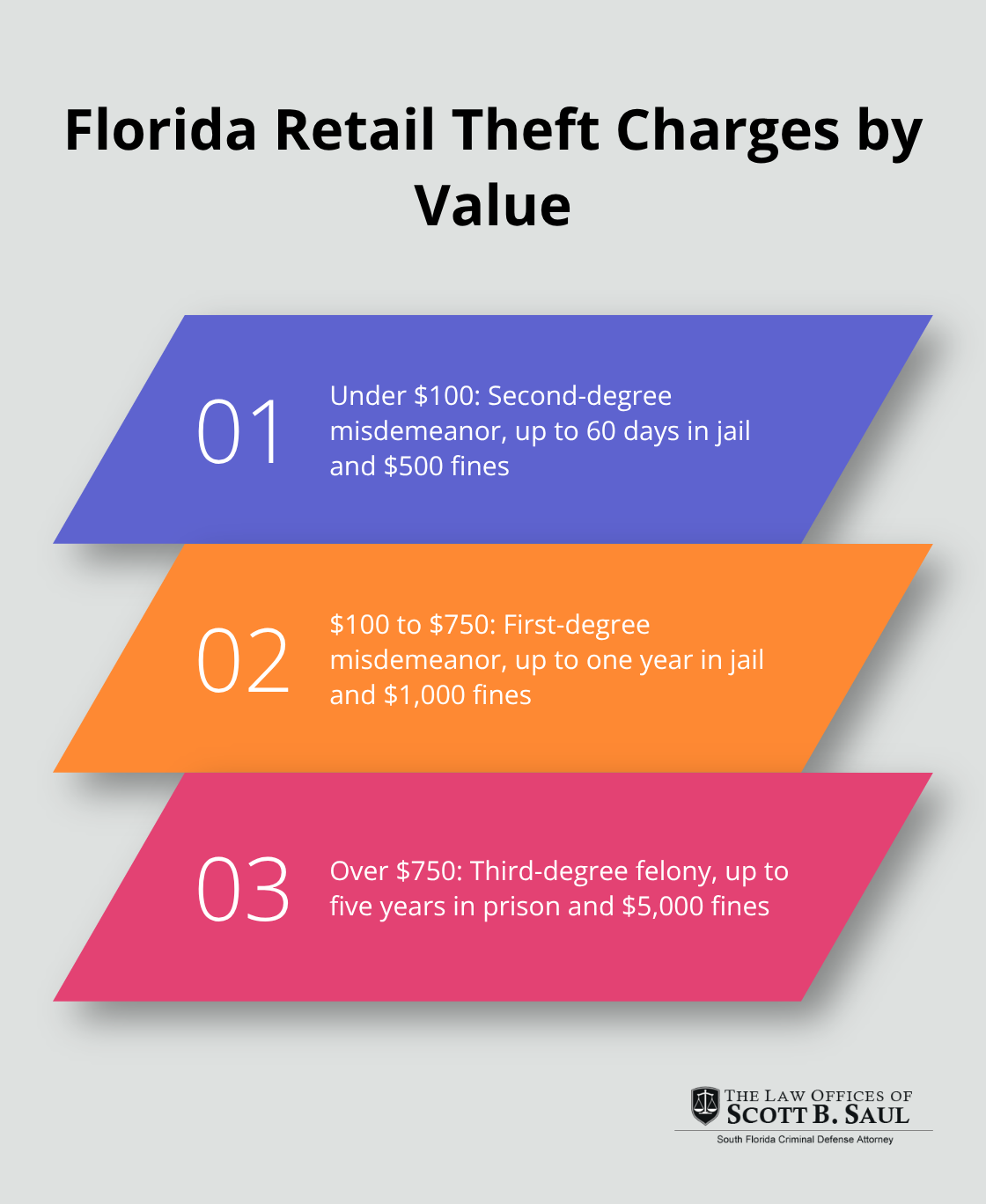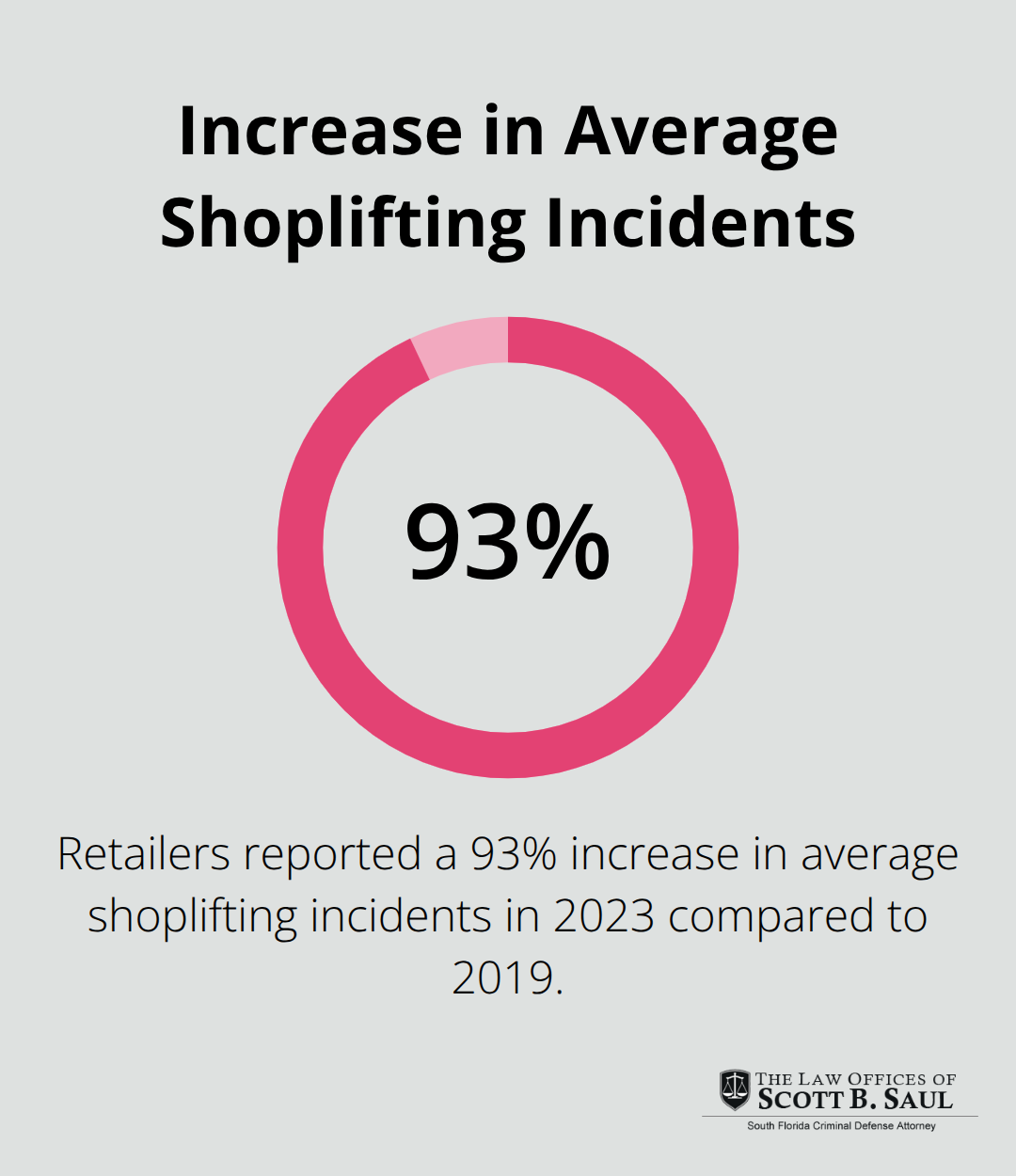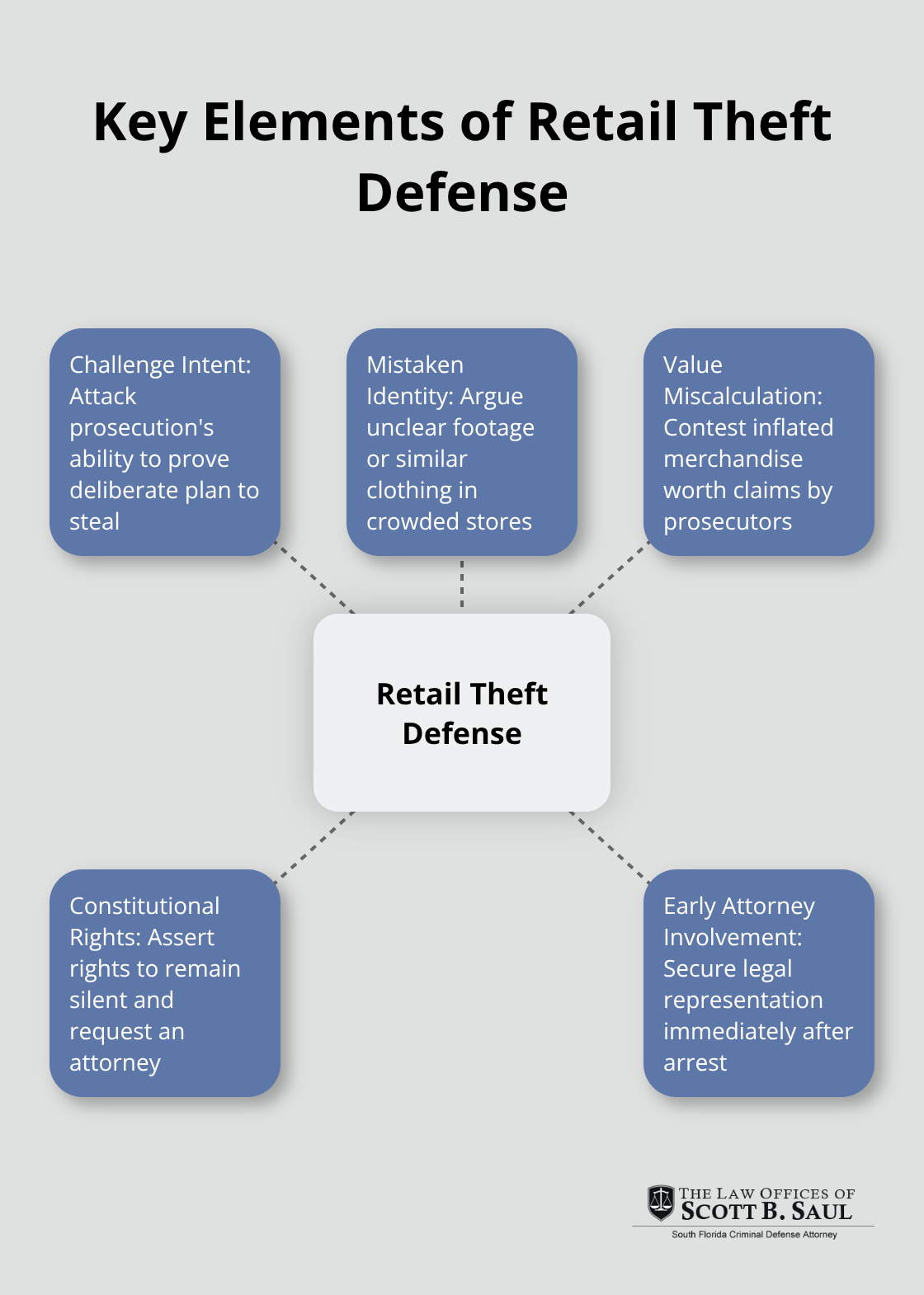Florida’s Retail Theft Laws Explained
By : saulcrim | Category : Criminal Defense | Comments Off on Florida’s Retail Theft Laws Explained
9th Oct 2025

Florida retail theft laws carry serious penalties that can impact your future for years. Even minor shoplifting charges may result in hefty fines and jail time.
We at Law Offices of Scott B. Saul see how these cases affect people’s lives daily. Understanding your rights and potential defenses is vital when facing these charges.
What Exactly Constitutes Retail Theft in Florida
Florida Statute 812.014 defines retail theft as the unlawful taking, altering, or removing of merchandise with the intent to deprive a merchant of possession and value. This definition covers far more than simply walking out with items. Price tag switching, merchandise concealment, or using devices to defeat anti-theft systems all qualify as retail theft under Florida law. The National Retail Federation reports that retail theft cost U.S. stores $45 billion in 2024, with Florida retailers alone losing approximately $5.4 billion in revenue to theft in 2022.
Value-Based Classifications Determine Your Charges
Florida categorizes retail theft charges based on stolen merchandise value, creating three distinct offense levels. Theft under $100 results in second-degree misdemeanor charges with up to 60 days in jail and $500 fines. Items valued between $100 and $750 trigger first-degree misdemeanor charges that carry one year in jail and $1,000 fines. Theft that exceeds $750 becomes a third-degree felony with five years prison time and $5,000 fines. Florida’s $750 felony threshold sits below the national average of $1,156, which means you face harsher penalties compared to most states.

Aggregation Rules Create Serious Risks for Multiple Thefts
Florida’s 120-day aggregation period allows prosecutors to combine separate theft incidents into felony charges when total value exceeds $750. This extended timeframe (increased from the previous 30 days) creates significant risks for repeat offenders. Stealing items worth $300 on three separate occasions within four months results in felony prosecution for $900 total value. Additionally, Florida law permits aggregation based on item count regardless of value. Taking 10 to 19 items across multiple thefts qualifies as third-degree felony, while 20 or more items constitute second-degree felony charges with up to 15 years imprisonment.
These complex classification systems and aggregation rules make Florida’s retail theft penalties particularly severe, which directly impacts the potential consequences you face in court.
What Penalties Do You Face for Retail Theft in Florida
Misdemeanor Penalties Can Still Devastate Your Future
Florida’s misdemeanor retail theft penalties pack a serious punch that many defendants underestimate. Second-degree misdemeanor charges for theft under $100 carry up to 60 days in jail and $500 fines, while first-degree misdemeanor charges for theft between $100 and $750 result in one year imprisonment and $1,000 fines. After a second conviction for petit theft, offenders face mandatory fines between $50 and $1,000, or community service equivalent to the fine’s value at minimum wage. These penalties might seem manageable, but the criminal record creates permanent damage. Employers routinely reject applicants with theft convictions, landlords deny rental applications, and professional licenses face suspension or revocation.
Felony Consequences Multiply Your Problems Exponentially
Third-degree felony charges for theft over $750 impose five years prison time and $5,000 fines, but the real devastation comes from felony status itself. Florida strips vote rights from felons until rights restoration completion, bars firearm ownership permanently, and excludes felons from jury service. Second-degree felony charges for theft over $20,000 carry significant imprisonment and fines. Retailers reported a 93% increase in average shoplifting incidents in 2023 versus 2019. This pattern makes aggregation rules particularly dangerous since prosecutors combine multiple incidents to reach felony thresholds.

Restitution Adds Financial Burden Beyond Court Penalties
Convicted offenders must pay full restitution that covers stolen merchandise value plus any damage costs. This financial obligation persists long after court proceedings end and cannot be discharged through bankruptcy. Courts calculate restitution based on retail price at the time of theft, not wholesale or discounted values. Store security footage and receipt records provide evidence for these calculations, which often exceed the defendant’s expectations.
Criminal Records Follow You for Life in Florida
Florida maintains permanent criminal records that appear on background checks indefinitely unless sealed or expunged through complex legal procedures. Employment applications routinely ask about criminal history, and theft convictions signal dishonesty to potential employers across all industries. Professional boards in healthcare, finance, education, and legal fields impose strict character requirements that theft convictions violate. Housing applications become nearly impossible to complete successfully with theft convictions since landlords view these crimes as indicators of future problems. Immigration consequences prove particularly severe for non-citizens, as retail theft convictions can trigger deportation proceedings or prevent naturalization applications from approval.
These severe penalties make professional legal representation essential when you face retail theft charges, as experienced attorneys understand the defense strategies that can protect your future.
How Can You Defend Against Retail Theft Charges
Proven Defense Strategies That Work in Florida Courts
Successful retail theft defenses attack the prosecution’s weakest elements rather than rely on jury sympathy. Intent proves the most vulnerable aspect since prosecutors must demonstrate you deliberately planned to steal merchandise. Video surveillance often fails to capture clear intent, especially when defendants handle items normally before alleged theft occurs. Mistaken identity defenses work well in crowded stores where security cameras capture unclear footage or when multiple people wear similar clothing.
Value miscalculation provides another strong defense angle since prosecutors frequently inflate merchandise worth to reach felony thresholds. Retail price tags don’t always reflect actual value, and sale prices or damaged goods reduce theft amounts significantly. Cases get dismissed when security footage shows defendants put items back or when store employees make identification errors under pressure.

Your Constitutional Rights During Arrest and Police Questions
Florida law permits store employees and security to detain suspected shoplifters for reasonable time periods, but this detention must follow strict legal procedures. You have absolute rights to remain silent and request an attorney immediately upon arrest. Police officers cannot force you to answer questions or sign statements without your lawyer present.
Store security cannot search your belongings without consent or probable cause, and improper detention procedures often lead to case dismissals. Many defendants damage their cases by explaining their actions or apologizing to security personnel. Retailers face challenges in detecting shoplifting incidents, which means they often make arrests based on incomplete information or rushed judgments.
Contact an Attorney Immediately After Any Retail Theft Arrest
Retail theft cases move quickly through Florida courts, and early attorney involvement makes the difference between conviction and dismissal. Experienced criminal defense lawyers negotiate with prosecutors before formal charges get filed, often securing dropped charges or reduced penalties. The Law Offices of Scott B. Saul brings over 30 years of trial experience and has successfully tried over 300 jury cases.
Pretrial diversion programs remain available for first-time offenders, but prosecutors rarely offer these opportunities without attorney advocacy. Evidence preservation becomes critical immediately after arrest since store surveillance footage gets deleted routinely and witness memories fade rapidly. Professional legal representation protects your rights and explores every available defense strategy.
Final Thoughts
Florida retail theft laws impose severe penalties that escalate quickly from misdemeanors to felonies based on merchandise value and aggregation rules. The $750 felony threshold sits below the national average, which makes Florida particularly harsh compared to other states. Criminal records from theft convictions create permanent barriers to employment, housing, and professional licenses that extend far beyond court penalties.
Professional legal representation proves essential when you face these charges. Experienced attorneys identify defense strategies that prosecutors overlook, negotiate reduced charges, and protect your constitutional rights throughout the process. Early intervention often prevents formal charges or secures pretrial diversion programs for first-time offenders (especially those with no prior criminal history).
Contact an attorney immediately before you speak with police or store security if you face retail theft charges. Preserve all evidence related to your case and avoid statements that could damage your defense. We at Law Offices of Scott B. Saul bring extensive trial experience and understand the defense strategies that protect your future and minimize the long-term consequences of these serious charges.
Archives
- October 2025 (3)
- September 2025 (9)
- August 2025 (8)
- July 2025 (8)
- June 2025 (9)
- May 2025 (9)
- April 2025 (8)
- March 2025 (9)
- February 2025 (8)
- January 2025 (9)
- December 2024 (10)
- November 2024 (5)
- July 2024 (2)
- June 2024 (2)
- May 2024 (2)
- April 2024 (2)
- March 2024 (2)
- February 2024 (2)
- January 2024 (2)
- December 2023 (2)
- November 2023 (2)
- October 2023 (2)
- September 2023 (2)
- August 2023 (1)
- July 2023 (2)
- June 2023 (2)
- May 2023 (2)
- April 2023 (2)
- March 2023 (2)
- February 2023 (2)
- January 2023 (2)
- December 2022 (2)
- November 2022 (2)
- October 2022 (2)
- September 2022 (2)
- August 2022 (2)
- July 2022 (2)
- June 2022 (2)
- May 2022 (2)
- April 2022 (2)
- March 2022 (2)
- February 2022 (2)
- January 2022 (2)
- December 2021 (2)
- November 2021 (2)
- October 2021 (2)
- September 2021 (2)
- August 2021 (2)
- July 2021 (2)
- June 2021 (2)
- May 2021 (2)
- April 2021 (2)
- September 2020 (5)
- July 2020 (4)
- June 2020 (4)
- May 2020 (4)
- April 2020 (5)
- March 2020 (4)
- February 2020 (4)
- January 2020 (4)
- December 2019 (1)
- November 2019 (4)
- October 2019 (4)
- September 2019 (4)
- August 2019 (4)
- July 2019 (5)
- June 2019 (4)
- May 2019 (4)
- April 2019 (4)
- March 2019 (4)
- February 2019 (4)
- January 2019 (4)
- December 2018 (4)
- November 2018 (5)
- October 2018 (5)
- September 2018 (4)
- August 2018 (4)
- July 2018 (7)
- June 2018 (4)
- May 2018 (4)
- April 2018 (8)
- March 2018 (4)
- February 2018 (4)
- January 2018 (4)
- November 2017 (4)
- October 2017 (4)
- September 2017 (4)
- August 2017 (7)
- July 2017 (6)
- June 2017 (4)
- May 2017 (4)
- April 2017 (4)
- March 2017 (4)
- February 2017 (7)
- January 2017 (4)
- December 2016 (7)
- November 2016 (4)
- October 2016 (4)
- September 2016 (10)
- August 2016 (4)
- July 2016 (4)
- June 2016 (4)
- May 2016 (4)
- April 2016 (4)
- March 2016 (4)
- February 2016 (7)
- January 2016 (4)
- December 2015 (5)
- November 2015 (4)
- October 2015 (7)
- September 2015 (4)
- August 2015 (4)
- July 2015 (13)
- June 2015 (9)
- May 2015 (8)
- April 2015 (6)
- March 2015 (4)
- February 2015 (4)
- January 2015 (4)
- December 2014 (4)
- November 2014 (4)
- October 2014 (4)
- September 2014 (3)
Categories
- Adjudication (1)
- Bankruptcy (1)
- Burglary Crimes (3)
- calendar call (1)
- Car Accident (1)
- Criminal Defense (359)
- Cyber Crimes (7)
- DNA (1)
- Domestic Violence (9)
- Drug Crimes (5)
- DUI (12)
- Embezzlement (1)
- Environmental Crimes (4)
- Expungement Law (2)
- Federal Sentencing Law (3)
- Firearm (3)
- Forgery (4)
- General (82)
- Healthcare (3)
- Immigration (1)
- Indentity Theft (1)
- Insurance (5)
- judicial sounding (2)
- Juvenile Crimes (4)
- Manslaughter (4)
- Money Laundering (3)
- Organized Crime (1)
- Racketeering (1)
- Reckless Driving (3)
- RICO (3)
- Sealing and Expunging (2)
- Sex Offense (1)
- Shoplifting (1)
- Suspended Driver's License (1)
- Traffic (4)
- Trending Topics (1)
- White-collar Offenses (1)

